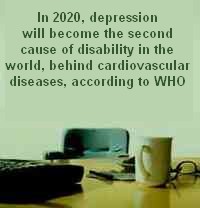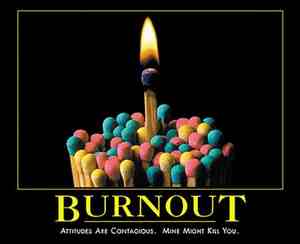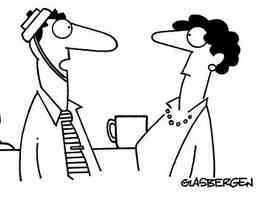Author: Dr Peremarty MD: Sleep and general medicine
A syndrome at the turning point between tiredness and depression?
Burnout is a
human relationship disease, close to depressive state, preceded by a
heavy load of stress combined with a lot of personal frustration.
Its evolution, which remains silent over a long period, can end in suicide (in case of depression) or induce health endangering behaviours (tobacco, alcohol, drugs and medication abuse).
In Japan, Karoshi, (or Karushi - literally: death (shi) from overwork (karu) - describes a decease (no matter the cause of death itself) related to an excessive work schedule .
The «Maslach Burnout Inventory» is a measurement tool developed by Christina Maslach and Susan Jackson in the USA in 1981 to allow to self-test one’s own degree of burnout or «internal combustion».
In 2007, it is still as valuable a standard tool to help highlighting the elements of the vicious circle which leads to the collapse by "internal combustion".

A - Exhaustion
B - Loss of empathy
C - Depreciation
NB: Burn out or depression?
Its evolution, which remains silent over a long period, can end in suicide (in case of depression) or induce health endangering behaviours (tobacco, alcohol, drugs and medication abuse).
In Japan, Karoshi, (or Karushi - literally: death (shi) from overwork (karu) - describes a decease (no matter the cause of death itself) related to an excessive work schedule .
The «Maslach Burnout Inventory» is a measurement tool developed by Christina Maslach and Susan Jackson in the USA in 1981 to allow to self-test one’s own degree of burnout or «internal combustion».
In 2007, it is still as valuable a standard tool to help highlighting the elements of the vicious circle which leads to the collapse by "internal combustion".

A - Exhaustion
B - Loss of empathy
C - Depreciation
NB: Burn out or depression?
In 1970, Herbert Freudenreich, a psychiatrist and psychanalyst,
describes, for the first time, this set of symptoms observed in volonteering carers who looked after drug addicts (and the story tells that he had, himself, suffered from that tiredness similar to an "internal combustion").
Later on, Maslach worked out a questionnaire, the "Maslach Burnout Inventory" (MBI 1981) which was first designed for the prevention of depression in health professionals who suffer from overwork.
"The extend of the phenomenon can be noticed, before all, in health professionals, in carers from high emotional risk units (cancerology, immuno/hematology, geriatrics, AIDS, recovery units, emergency ambulance service...), but also in volunteers who take an active part in help and support associations for people who are HIV positive or suffer from AIDS.
Flight attitudes, disinvestment from work, repeated absenteeism are often observed in these professions. Indeed, taking one’s job every day becomes more and more difficult.
Elsewhere, an "over-investment of the professional activity until the person becomes unable to leave work, even if the extra work is inefficient" is observed. That behaviour of "presenteeism" is more typically encountered in managers" (Laurence ALTMANN, medicine thesis, 2000, "Stress evaluation ... " (in French).
In Japan, "KAROSHI" 過労死 ("death from work") is a chart, very much like burnout, which is acknowledged as a professional illness (since 1988) regardless to the worker’s category
"Regarding karoshi, according to the result of a survey made by an insurance company (4) with people from 20 to 50 years of age, 88% men considered that they had a high probability or (37%) several chances to die from karoshi. 76,2% of them declared that their work was hard and 80,5% admitted that they went to work even if they had a flu. 70% men between 20 and 39 years considered that they worked too much and 80% of them would have liked to work less hours to enjoy their family and children. In Japan, about ten thousand people have been numbered who died from karoshi but, already since 1989, one man in eight died from "sudden" death according to a study by journalist Saitou Shigeo". (Forum Japon.com)
In France, recent affairs of suicides in working places underline the increasing extend of that kind of pathology, not very far-off from the state of tiredness which strikes subjects whose sleep is inefficient (read the article about the "hypo-sleep syndrome").
Note:
The «Maslach Burnout Inventory» is used in professional stress situations with a goal of prevention and enhancement of the working conditions. From our point of view that questionnaire could be adapted for the evaluation of family mothers whose work is not less hard or stressing than any paid worker’s.
Maslach Burnout Inventory (MBI)
This questionnaire is meant to evaluate three negative opinions about one’s job : tiring, not interresting and little rewarding.The 22 sentences below stand for feelings someone may experience about work.
Please answer "yes" or "no" to the following statements:
I /. Professional exhaustion
The emotional exhaustion witnesses for a tiredness felt at the very idea of working. That kind of disorders are often considered like an "anxio-depressive syndrome".
For Maslach "exhaustion is the key component of burnout" and disappears during holidays, which makes it out from an authentic depression.
1) I feel emotionally drained from my work.
2) I feel used up at the end of the workday.
3) I feel fatigued when I get up in the morning and have to face another day on the job.
6) Working with people all day is really a strain for me.
8) I feel burned out from my work.
13) I feel frustrated by my job.
14) I feel that I am working too much on my job.
16) Working with people directly puts too much stress on me.
20) I feel that I’m at the end of my rope.
total "yes" answers : ......./9
-total score lower than 4 : low burnout
-total score comprized between 4 and 6 : moderate burnout
-total score higher than 6 : serious burnout
II /. "Loss of empathy"
The "loss of empathy" is a feeling of dehumanization of one’s relationships to others, with disregard and cynism, which leads the subject to inhibit any warm attitude toward clients or colleagues.
5) I feel I treat some recipients as if they were impersonal objects.
10) I’ve become more callous toward people since I took this job.
11) I worry that this job is hardening me emotionally.
15) I don’t really care what happens to some recipients.
22) I have the feeling that some recipients blame me for some of their problems.
Total "yes" answers : ......./5
-total score lower than 2: low burnout
-total score comprized between 2 and 3: moderate burnout
-total score higher than 4 : serious burnout
Author’s note: In our opinion, the "depressive turn" of burnout precisely occurs when the subject loses his/her usual "taste for other people" and withdraws into solitude.
The term of "Mother Theresa Syndrome" is often used to describe the behaviour of these exhausted people with (fibromyalgia, "spasmophilia" or "chronic fatigue" ) who, still, show a lot of altruism in their job or family.
III/. Personal Fulfilment
The feeling of personal fulfilment or achievement at work is indispensable for the psychological (and somnological) balance.
In the opposite case, the person, who assets him/herself negatively, will doubt his/her true abilities and add up even more emotional tiredness in situations of stress (which leads to insomnia ).
4) I can easily understand how my recipients feel about things.
7) I deal very effectively with the problems of my recipients.
9) I feel I’m positively influencing other people’s lives through my work.
12) I feel very energetic.
17) I can easily create a relaxed atmosphere with my recipients.
18) I feel exhilarated after working closely with my recipients.
19) I have accomplished many worthwile things in this job.
21) In my work, I deal with emotional problems very calmly.
Total "no" answers : ......./8
-total score lower than 3 : low burnout
-total score comprized between 3 and 5 : moderate burnout
-total score higher than 6 : serious burnout
- "I am wearing a smoke detector, the doctor said I’m close to burnout"
Measurement of the burnout threat
The three feelings evaluated by the questionnaire maintain each other in a true vicious circle.The risk (of suicidal attempt or functional disability) occurs in a sudden and unpredictible way with the collapse of the subject’s resistance abilities.
Elsewhere, that state favours addictive behaviours (tobacco, alcohol, tranquillizers or drugs) and the appearance of intercurrent pathologies.
The person who struggles against burnout is not aware of the existence of that breaking point and thinks he/she will be able to stand fast (without being able to change his/her situation or even think about it).
The qualitative measurement of the burnout threat results from the sum :
- of the "Yes" answers of the questions from groups I and II
- and the "No" answers from group III.
-total score lower than 8: low burnout : "Maybe there is something you can enhance".
-total score comprized between 8 and 16: moderate burnout :"You should take serious measures"
-total score higher than 16 : high burnout : "Caution: danger! Do not stay alon(e) with it, get some help to take care of it".

Definition and physiopathology of Burn Out.
Il consists in, at the same time:- an emotional exhaustion;
- a dehumanization of the relationship with others
- and a feeling of professional failure.
These elements being associated to difficult working conditions over long periods of time.
- The causes are linked to work on one hand : Bad organization and/or no positive conditions, like a lack of gratification, little professional support and poorly defined targets).
- On the other hand, some causes are linked to the subject him/herself, like a personal vulnerability, a failure in one’s personal management of strength, an idealist or even unrealistic vision of one’s job.
- a negative affective state,
- negative work conditions,
- idealistic aspirations,
- a noticeable decrease of performances,
- an absence of psychopathological medical past history,
- a good functioning prior to work,
- an enhancement during holidays,
- an irréversibilité without exterior help.
How to avoid to eat up one’s reserves?
(inspired by http://www.references.be A Belgian website of "job offers and concrete information about all aspects of work".)To do or to avoid in case of exhaustion
NB. It is wrong to believe that one has to reduce one’s activity and "slow down" a little. It is, to the contrary, important to remain active, but of course in fields and with people you like.
Here is a set of advice to help you :
* Do one thing at the time : it is best to concentrate entirely on one thing only rather than partly on several things.
* Learn to planify : everybody lacks time nowadays. That is why it is important to learn to share one’s time efficiently and define priorities (see our file about time management).
* Try to find out what is important in your life : leave behind the rush from time to time to concentrate on what really matters for you. Reorientate yourself if you turn your back to your priorities. Do not forget that life is much more than work.
* Learn to say no : even if you do your best, you will never be able to do everything or satisfy everybody. Be assertive and dare to say no. Do not either always take over the tasks or problems of other people.
* Listen to yourself : Headaches, susceptibilité, tendency to isolate yourself : these aren’t random symptoms. Watch out for them and react on time if necessary.
* Have exercise : it may be the last thing you want to do when you get back home exhausted, but it is worth it. You will feel very tired but also very satisfied after that.
* Do not worry, act : worrying has never been of any use. Grab your problem or learn to solve it with discussing it with appropriate advisers (colleagues, friends...)
* Avoid perfectionism : Do not try to be perfect with everything, an average result is usually widely enough. Everybody makes mistakes and everybody learns from them. Forget the idea that everything you do yourself will be done better ; do not be afraid to delegate.
* Be yourself : accept yourself as you are, with your defects. Your self-esteem must not depend from other people’s opinions.
* Do pleasant or sociable things : meet your friends and go out, go see a nice film, eat lunch outside with your colleagues, read a relaxing book,... give yourself these moments without feeling guilty.
* Laugh! : Work may be a serious matter, there is no reason for keeping oneself from laughing. Above all, do not lose your sense of humour. Do not forget to relativize and see things from a large perspective.
"Somnications"
Somnications are especially indicated in this context:- when getting up : activity, leisure and sport (according to each person’s taste);
- pleasure (sans modération);
- light (sun and light therapy lamps);
- the nap (according circumstances and with moderation) to be able to "ride the wave" and adapt, in accordance with one’s means, to the demands of modern life.
Conclusion
The appearance of "functional disorders": disabling, worrying, capricious and mysterious, in a context of overwork is a sign of decompensation of the subject’s resistance abilities.See the article "alarm system of tiredness"
Burnout can be compared to the General Adaptation Syndrome (GAS) which, according to H. Selye, in 1946, evolves over time in three stages :
Ÿ - the alarm or alert reaction,
Ÿ - the adaptation or resistance stage, punctuated with functional disorders.
Ÿ - and the exhaustion stage which would match burnout.
These pathologies are, besides, found in the medical past history which make the "assault course" of the subjects who suffer from fibromyalgia.



